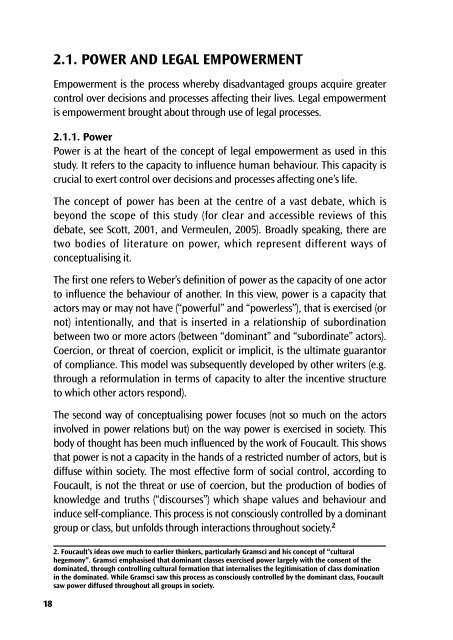Legal empowerment for local resource control
Legal empowerment for local resource control
Legal empowerment for local resource control
Create successful ePaper yourself
Turn your PDF publications into a flip-book with our unique Google optimized e-Paper software.
18<br />
2.1. POWER AND LEGAL EMPOWERMENT<br />
Empowerment is the process whereby disadvantaged groups acquire greater<br />
<strong>control</strong> over decisions and processes affecting their lives. <strong>Legal</strong> <strong>empowerment</strong><br />
is <strong>empowerment</strong> brought about through use of legal processes.<br />
2.1.1. Power<br />
Power is at the heart of the concept of legal <strong>empowerment</strong> as used in this<br />
study. It refers to the capacity to influence human behaviour. This capacity is<br />
crucial to exert <strong>control</strong> over decisions and processes affecting one’s life.<br />
The concept of power has been at the centre of a vast debate, which is<br />
beyond the scope of this study (<strong>for</strong> clear and accessible reviews of this<br />
debate, see Scott, 2001, and Vermeulen, 2005). Broadly speaking, there are<br />
two bodies of literature on power, which represent different ways of<br />
conceptualising it.<br />
The first one refers to Weber’s definition of power as the capacity of one actor<br />
to influence the behaviour of another. In this view, power is a capacity that<br />
actors may or may not have (“powerful” and “powerless”), that is exercised (or<br />
not) intentionally, and that is inserted in a relationship of subordination<br />
between two or more actors (between “dominant” and “subordinate” actors).<br />
Coercion, or threat of coercion, explicit or implicit, is the ultimate guarantor<br />
of compliance. This model was subsequently developed by other writers (e.g.<br />
through a re<strong>for</strong>mulation in terms of capacity to alter the incentive structure<br />
to which other actors respond).<br />
The second way of conceptualising power focuses (not so much on the actors<br />
involved in power relations but) on the way power is exercised in society. This<br />
body of thought has been much influenced by the work of Foucault. This shows<br />
that power is not a capacity in the hands of a restricted number of actors, but is<br />
diffuse within society. The most effective <strong>for</strong>m of social <strong>control</strong>, according to<br />
Foucault, is not the threat or use of coercion, but the production of bodies of<br />
knowledge and truths (“discourses”) which shape values and behaviour and<br />
induce self-compliance. This process is not consciously <strong>control</strong>led by a dominant<br />
group or class, but unfolds through interactions throughout society. 2<br />
2. Foucault’s ideas owe much to earlier thinkers, particularly Gramsci and his concept of “cultural<br />
hegemony”. Gramsci emphasised that dominant classes exercised power largely with the consent of the<br />
dominated, through <strong>control</strong>ling cultural <strong>for</strong>mation that internalises the legitimisation of class domination<br />
in the dominated. While Gramsci saw this process as consciously <strong>control</strong>led by the dominant class, Foucault<br />
saw power diffused throughout all groups in society.

















